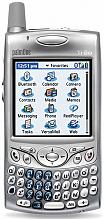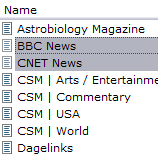Thu December 16 2004
 Thank You For Being a MobileRead Reader!!! Thank You For Being a MobileRead Reader!!!
|
|
06:26 PM by Bob Russell in Miscellaneous | Lounge
You would probably be amazed by the amount of work done behind the scenes by the creator and administrator of MobileRead, Alex Turcic. He can be flat on his back, sick in bed, and he will still be working on ways to make this place even smoother and more enjoyable for all. (I'm sure all the web site teams out there can understand what I'm talking about!) We are very grateful for all his efforts. By the way, some of our newest visitors may be saying to themselves, what is MobileRead about anyway? Is this a site all about mobile reading? Well, the answer is yes. And no! Yes it's all about mobile reading. Sure, this is a wonderful place to learn about reading ebooks, clipping web content for reading later on your mobile devices etc. But no, we are not limited to such a small set of topics. Once you start discussing reading on a mobile device you are completely and inextricably tied to a myriad of related topics. The web, blogging, emerging technology, games, video, desktop PCs, smartphones,... and even operating systems like Palm Cobalt. I'm sure there are also many more related topics that will grow naturally as the technology progresses. That's part of the fun. Plus we have a community center in the forums where you don't even have to talk about the web or reading or technology at all. You're perfectly welcome to share about the new dog your Aunt Martha bought your daughter for a birthday present if you like! We think our topics are a natural fit, and you our readers have supported that hypothesis by demonstrating a lot of interest in those sorts of topics. We want to be inclusive, and provide a community where we can all share and enjoy all sorts of thoughts and information. So as we approach the close of another year, thank you all for being a part of our growing community. We're having a great time, and look forward to many more years to come. |
|
[ 1 reply ] |
 Another View of PalmSource's Future Another View of PalmSource's Future
|
|
06:05 PM by Bob Russell in Archive | Handhelds and Smartphones
He gives his take on the future of PalmSource. Well worth the read, it is a very positive and thoughtful look at their future. |
|
[ 0 replies ] |
 Wi-Fi SD card support on your Treo 650 Wi-Fi SD card support on your Treo 650
|
|
04:30 PM by sUnShInE in Archive | Handhelds and Smartphones
Download the file and read the installation instructions here. In 6 easy steps you should be swingin with Wi-Fi. Note: This is not officially supported by palmOne, which may void your warranty or service agreement, so proceed at your own risk. < / buzzkill> |
|
[ 1 reply ] |
 [Librie] Sony Librie Firmware upgrade [Librie] Sony Librie Firmware upgrade
|
|
04:19 PM by Alexander Turcic in More E-Book Readers | Legacy E-Book Devices
Firmware V1.0.00.06160 contains some performance improvements related to dictionary access and sound output. What is more interesting about this firmware upgrade is that it could reveal hackers some ideas how to directly access the software of the Librie, perhaps to replace parts of or even the entire operation system with a more "user-friendly", i.e. non-DRM system. [VIA Librie list] |
|
[ 2 replies ] |
 FCC approves cheaper WiFi technology on planes FCC approves cheaper WiFi technology on planes
|
|
03:19 PM by Alexander Turcic in Archive | Handhelds and Smartphones
Unlike Connexion, which costs roughly USD $500,000 per jet to install the needed equipment, airlines can now offer high-speed Internet connections for 1/5th of the costs through the frequencies used by seatback phones. The article also mentioned the possible end of the ban on in-flight use of cell phones. Unfortunately, results of an independent study aren't due until 2006. Update: Here is a link to the official FCC statement on broadband services while in-flight. [Article first seen at PDA247] |
|
[ 0 replies ] |
 Sunrise 0.40 pre1 released Sunrise 0.40 pre1 released
|
|
03:06 PM by Alexander Turcic in Archive | Sunrise
Sunrise V0.40 comes with a lot of new enhancements, so make sure you give it a try if you haven't seen Sunrise in action before: |
|
[ 16 replies ] |
Wed December 15 2004
 Insider reveals: What Does "Palm OS for Linux" Mean? Insider reveals: What Does "Palm OS for Linux" Mean?
|
|
11:12 PM by Bob Russell in Archive | Handhelds and Smartphones
After the seeming bombshell announcement from PalmSource that there will be future versions of Palm OS Cobalt running on top of Linux, I have seen a lot of confusion over what this actually means, particularly to the end-user. This article will explain what you can expect and provide some technical background on how we expect to accomplish this. Before digging into the technical details, I should say that, in a nutshell, as a user you can expect the experience of a future Palm OS Linux-based device to be basically the same as what we have now in Palm OS Cobalt. As an analogy, you can look at Mac OS X: though it sits on top of another open-source Unix operating system (in this case Mach/BSD), that is not the part a user directly sees or experiences. Likewise, in the future when Palm OS is running on Linux, the overall platform will still provide the same basic user experience and programmer APIs that we have now. One reason for the confusion about what this announcement means is that there is just a lot of confusion over what “Linux” means. People commonly use the name “Linux” to refer to the overall platform they experience: this includes the kernel, windowing system, UI framework, multimedia components, applications, etc. However, technically Linux is only the kernel portion of this full platform, and that is the part we are generally referring to as “Palm OS for Linux”. The kernel itself provides only the basic parts of an overall platform. It is roughly responsible for managing processes and enforcing memory protection and security between them, managing threads and providing synchronization primitives for them, providing basic IO such as “write this byte to the serial port”, providing controlled access to hardware and defining how one writes drivers for that hardware, and defining how persistent storage is structured and accessed. Everything else is the responsibility of software on top of the kernel. For example, to show something on the screen, some software outside of the kernel may ask that kernel for access to the screen, and then it is free to modify the pixels on the screen however it wants. Even a seemingly fundamental thing like the shell is not part of the kernel itself – which is why there are so many different shells available on Linux! As it turns out, modern kernels share a lot of similarities when viewed from the outside. The kernel we currently use in Palm OS Cobalt (which was written in-house by PalmSource) is itself a modern kernel, and a large amount of our effort in developing Palm OS Cobalt was spent in re-designing and implementing the overall Palm OS platform architecture so that it would work well on top of a kernel with protected memory, threads, and other modern features. The vast majority of that work is directly relevant to Linux as well, and will carry over as-is. Building “Palm OS for Linux” means, in essence, porting all of our existing platform frameworks from the current Palm OS Cobalt kernel to the Linux kernel. This includes such familiar things as the Exchange Manager, Window Manager, Form Manager, Event Manager, Data Manager, as well as the numerous internal frameworks (Binder, the Media Framework, view hierarchy and graphics system) that they are built on. Some of the lower-level parts of the system (such as Palm OS Cobalt’s new SysThread.h APIs and the low-level parts of the application manager) will need to be rewritten in this port, but that will be the unusual case. In fact, Palm OS has already been running on three different kernels through its lifetime: a licensed kernel for 68k versions of the system, a new kernel used in 5.x, and finally the kernel we currently use in Palm OS Cobalt. All 68k applications should run as-is on this new platform just as well as they run today on Palm OS Cobalt. However, we have announced that Protein applications (which are written for the native ARM APIs in Palm OS Cobalt) may require a recompile to run on “Palm OS for Linux.” This statement was made because Linux typically uses a different approach to calling platform library APIs than we use in Palm OS Cobalt, and it is too early for us to be able to promise more compatibility than that. Ultimately what this all means is that our users and developers will still have Palm OS much like it exists today in Palm OS Cobalt. This is a long-term project, and we expect to see a variety of devices using the current version of Palm OS Cobalt out in the market in the coming year. The move to Linux will be a progression of our overall development of the Palm OS Cobalt platform. One final question I would like to address is if this means one will be able to run Linux applications on Palm OS. In theory, when the underlying Linux kernel is there, basic applications should be able to compile for it with little to no change. You need to aware, however, that the higher-level parts of the platform will be Palm OS. This means, for example, that X Windows will not be running on your handheld device – we will be using the Palm OS graphics and windowing system instead. It will be possible, with various amounts of work, to get these other software components from the open source community to work on our platform, but this is not something in which PalmSource itself will likely invest much time. ================================================== == Editor's note: MobileRead is delighted to present this article by Dianne Hackborn from PalmSource, which is the unexpected benefit of a recent exchange of emails. I first discovered Dianne over at Palm Infocenter where she grabbed my attention with some great information and the sanity she brought into the forum chatter about PalmOS devices and the future of PalmSource. I knew immediately that we all needed to hear more from her, and she was kind enough to respond by providing this information. With the recent slowdown in product announcements, plenty of speculation and rumors have started to surface. And as impatient consumers and hobbyists, surely it doesn't take much to convince us that the sky is falling. We have very little to go on, so it's a joy to hear from someone who has real information. Believe me, the more information and detail you get, the more it all makes sense and the more you will be excited about the future. There are admittedly challenges ahead for PalmOne and PalmSource, but maybe what we need is just a bit more patience. Two very significant investments have been announced towards the future of all things "Palm" -- the Cobalt OS (currently in the hands of device makers), and the Palm OS for Linux (which commitment is evidenced in the acquisition of CMS, a software company that makes Linux-based mobile phones.) In some big ways, we are seeing the "cost" now in a slowdown in product announcements, which is exaggerated by the withdrawal of Sony from the US PDA market. But we yet hope to reap the benefits for years to come over the aging Garnet internals. Palm/PalmSource didn't succeed without taking some bold steps in the past, and personally, I'm glad they have the guts to continue innovating. Those who play it safe in a competitive market will die. But no matter how wonderful and forward-thinking Cobalt may be, we will not be convinced it's real until we hold a device in our hands. And we will probably not fully appreciate the rejuvenation of the internals until we start to see those improvements in the externals, i.e. in handhelds and software. It's been a tough wait for all Palm fans, even for those at PalmSource. I've been one of the more vocal "worryers" myself. But there is every reason to believe devices are on their way, and after hearing some of the input from Dianne, I'm much more encouraged about the future of Cobalt. I also want to remind everyone that we need to be careful not to jump to conclusions from insider comments about early versions of Cobalt. After "completion" of the OS, there was much work done to fine tune performance and compatibility for final release form. In addition, there is a balancing act between satisfying particular vendors enhancement requests and doing new features development. Cobalt is alive and maturing, and is prepared for the future. I hope that as you read this insider information, that you will put aside some of your preconceived notions and any disappointments, and rekindle a bit of the excitement that so many of us have felt through the years with Palm. You may just find that there's a lot of pleasant surprises in store for PalmOS. No matter what OS preferences you have, or what your views of the "best" path for PalmSource and PalmOne, I think we can all agree on one thing -- we are all cheering for Palm to succeed, and the more they succeed, the more the entire mobile computing world benefits. BobR |
|
[ 7 replies ] |
 Square screen Pocket PC Devices, Like Treo? Square screen Pocket PC Devices, Like Treo?
|
|
06:56 PM by Bob Russell in Archive | Handhelds and Smartphones
This may be preparation for a new Pocket PC Treo. Or all kinds of new form factors. If you look at the thread comments you will find pretty unanimous sentiments that square screens are not very interesting if they are 240x240, but if they are at least 320x320 maybe it's worth a look. I would agree. |
|
[ 6 replies ] |


 As always, we at MobileRead are thankful to all of our readers for being a part of the MobileRead community, whether you just make frequent visits here or whether you are a frequent contributor. We hope you will all continue to enjoy our content and even participate in our forums. I think that you'll find the MobileRead team is continually making an effort to make this a better and better site.
As always, we at MobileRead are thankful to all of our readers for being a part of the MobileRead community, whether you just make frequent visits here or whether you are a frequent contributor. We hope you will all continue to enjoy our content and even participate in our forums. I think that you'll find the MobileRead team is continually making an effort to make this a better and better site.  Thanks to Andrew over at Treonauts.com for pointing me to his article at
Thanks to Andrew over at Treonauts.com for pointing me to his article at  While
While  Sony has released a downloadable
Sony has released a downloadable  This is bad news for Boeing's exclusive "Connexion" technology, which uses satellites to get air passengers online. Associated Press
This is bad news for Boeing's exclusive "Connexion" technology, which uses satellites to get air passengers online. Associated Press  Laurens decided to
Laurens decided to  Latest E-Books
Latest E-Books

